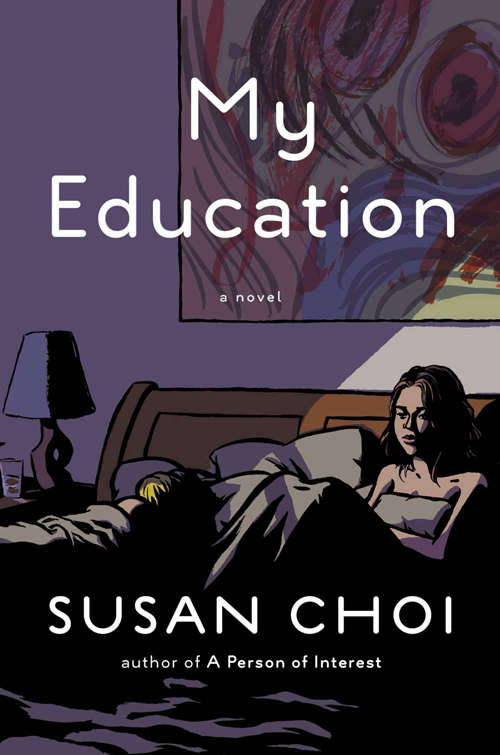I’ve been on a bit of a bisexual book binge lately, so after the Lambda Literary awards were announced and Susan Choi’s third novel My Education was declared the winner in the category of bisexual fiction, I thought I should pick it up. I have a healthy amount of skepticism about the decision making at the lammies but I decided this book was probably a good place to start. I’m glad, actually, that I didn’t have high expectations because this book ended up blowing me away. I loved it. I really loved it.
First of all, I loved the writing. I know it’s not everyone’s cup of tea, but I found the juicy, exquisite wordiness just so fun. It was like reading a Victorian novel, but about a biracial, bisexual American woman in the 90s and 2000s. I totally see how other people find Choi’s style pretentious and excessive, but to me it was self-consciously so, if that makes any sense. Her sentences are so interesting and versatile. I particularly enjoyed the discrepancy between the more formal grammar (Choi never ends a sentence with a preposition, but always uses “to/for/in which”, for example) and the emotionally immature and sexy material. Choi pays really close attention to what her characters are doing and saying and a lot of the descriptions of both mundane and profound events are strikingly beautiful. Like here:
“My youth was the most stubborn, peremptory part of myself. In my most relaxed moments, it governed my being. It pricked up its ears at the banter of eighteen-year-olds on the street. It frankly examined their bodies. It did not know its place: that my youth governed me with such ease didn’t mean I was young. It meant I was divided as if housing a stowaway soul, rife with itches and yens which demanded a stern vigilance. I didn’t live thoughtlessly in my flesh anymore. My body had not, in its flesh, fundamentally changed quite so much as it now could intuit the change that would only be dodged by an untimely death, and to know both those bodies at once, the youthful, and the old, was to me the quintessence of being middle-aged. Now I saw all my selves, even those that did not yet exist, and the task was remembering which I presented to others.”
When I say some of the material is emotionally immature, it’s because the main character Regina is a twenty-one year old English literature graduate student: she’s fallen head over heels in love for the first time and thinks it’s going to last forever and she’s naïve and passionate and, of course, never going to be the same again. What I really loved about how the book started is that it sets you up to think that Regina is going to have an affair with an older male professor, when it’s in fact his wife that she ends up falling in love with. I enjoy the idea of straight people picking up this book and being shocked at the turn of event a few chapters into the book. It’s a whirlwind affair that you know is not going to end well, but the ride is really fun.
Another thing I really enjoyed about this book was the academic setting: Choi has kind of the perfect balance of understanding but scrutiny of academia. Having left academia, I found it kind of fun to have a little fictional sojourn back in its clutches. These grad students have lots of time for sex and drinking and aren’t all stressed out and competing about who has more work, like the ones in my real-life grad school experience.
My Education doesn’t end when the relationship between Regina and Martha does. It doesn’t even end when, in their grief, Regina and Nicholas (Martha’s ex-husband) have an affair of their own. Interestingly, the book skips fifteen years ahead and we get a glimpse of a middle-aged Regina, married to a man and the mother of a young kid. There’s a focus on catching up on what all the other characters have been doing all these years, and we get to see not only where Regina ended up, but also Nicholas, Martha, their son, and Regina’s old roommate / friend Dutra (who was perhaps my favourite character, although I’m not exactly sure why). I liked all of the characters a lot more after seeing them in these respective later life stages, actually. It made me able to forgive them for some of the shitty things they did in the past. This section just had a fun “what are they doing now?” feel to it.
But it was also necessary to conclude Regina’s emotional journey, which, as she says, is this, essentially: “I didn’t grasp that desire and duty could rival each other, least of all that they most often did.” The lesson that Regina learns, however, is conservative: despite seeing Martha again and briefly renewing their passionate relationship, Regina returns to her husband and child (pregnant with another one). In other words, she chooses duty over desire. But can’t they go together? Unfortunately for the husband, you never really get why Regina loves him, although you’re supposed to know. She loves her son—that much is obvious.
And this is where the book kind of loses me. I mean, it didn’t really lose me but I guess I felt like a bit of something was off, or missing. What I mean is I would have liked Choi to be a bit more explicit about bisexuality in this book, if only to point out to all the dumbasses calling this a book about two straight women having an affair that they’re both obviously bisexual (the book is even clear that Martha has had more than one relationship with a woman). There are so few good books about bi women! Why can’t you use the b word, Susan Choi, just once??
I like the naturalness that flows in the earlier part of the book because nothing outside of the relationship matters. It would have felt unnatural to get bogged down with identity politics in that section. But later on in Regina’s life, why doesn’t her husband know about this affair? How could you be married to someone and never have told them about the first time you fell in love? This feels like (internalized) biphobia to me and I wish the book would have addressed it. How can the relationship with Martha have had no effect on Regina’s sexual identity or later sexual experiences?
Similarly, Regina’s background being both white and Asian is mentioned once and never brought up again. It’s not like I want the focus of the book to be on her racial and sexual identity, but those things are relevant in real life, they’re a part of real life. Ignoring them just felt kind of weird at best, and apolitical at worst. Like, what are you trying to avoid?
Despite (or maybe because of?) my ramblings about the book’s relationship with bisexual politics, I highly recommend My Education. On top of everything else, I loved, loved, loved the ending. That is a rare thing indeed for me.





Danika @ The Lesbrary says
Yeah, I also felt weird about Regina’s relationship with her husband. Are we supposed to believe that it’s better to have a pragmatic relationship with no passion? Or that that kind of relationship is more mature? Or that you have to make a choice between passion or a functioning relationship? Or maybe this is a dichotomy Regina created for herself–that she believes that she’ll never feel passion like that again, so she doesn’t bother to seek it out.